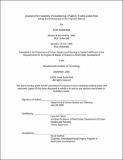Assessing the feasibility of establishing a publicly traded global real estate fund domiciled in the Cayman Islands
Author(s)
Butterfield, Scott (Scott Alan)
DownloadFull printable version (824.7Kb)
Other Contributors
Massachusetts Institute of Technology. Dept. of Urban Studies and Planning.
Advisor
Lynn M. Fisher.
Terms of use
Metadata
Show full item recordAbstract
This thesis examines the feasibility of creating a publicly traded, synthetic REIT-type investment fund for the purpose of investing in a portfolio of international real estate assets. The investment strategy is driven by both an increasing supply of international real estate opportunities and an increasing demand for international real estate investments. The fund will be domiciled in the Cayman Islands, where it will benefit from a tax exempt status, limited regulations, and a well established investment fund industry. The global investment strategy of a synthetic REIT-type Cayman Islands fund is a novel investment strategy. Because no standard investment structure for an international real estate fund exists, the analysis will focus on creating a fund level and tier level structure in order to achieve certain defined investment, tax, and regulatory objectives. These objectives include providing accessibility to a broad range of investors, minimizing taxation, minimizing regulatory requirements, providing market liquidity and transparency for shareholders, and targeting real estate investments in 40 countries. A primary focus will be on creating a tax-efficient tier structure for repatriating income from real estate investments to the fund. (cont.) The feasibility of the fund will be assessed based on how successfully it achieves these objectives. In general, the fund will have several competitive advantages over international REITs, REOCs, and private equity real estate funds. The fund will not have to comply with various organizational, asset, income, long-term debt, distribution, and foreign ownership rules that are imposed on REITs in order to achieve a tax exempt status. REOCs are subject to corporate level taxation and many REITS impose withholding tax on dividends to foreign investors. The fund will be more tax-efficient because no such taxes will be imposed on the fund. The fund will provide more market liquidity and transparency, to a broader range of investors, than private equity real estate funds can provide. Additionally, since most REITs and REOCs are domestically focused, the global investment strategy will provide greater portfolio diversification benefits.
Description
Thesis (S.M.)--Massachusetts Institute of Technology, Dept. of Urban Studies and Planning, 2006. This electronic version was submitted by the student author. The certified thesis is available in the Institute Archives and Special Collections. Includes bibliographical references (p. 117-122).
Date issued
2006Department
Massachusetts Institute of Technology. Department of Urban Studies and PlanningPublisher
Massachusetts Institute of Technology
Keywords
Urban Studies and Planning.